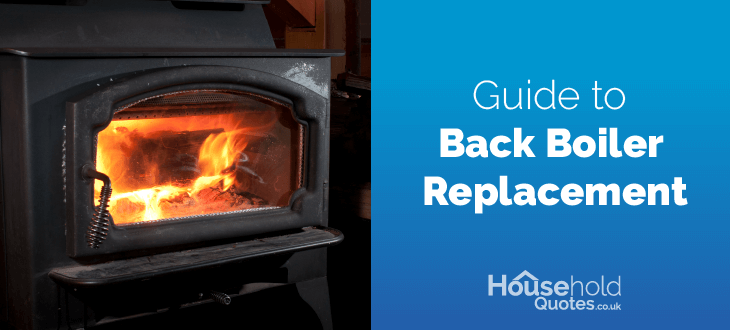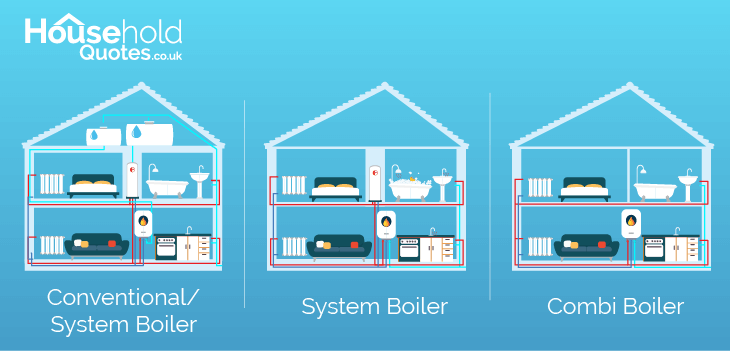Answer these simple questions and we will find you the BEST prices
Which type of solar quotes do you need?
It only takes 30 seconds
100% free with no obligation

Get up to 3 quotes by filling in only 1 quick form

Compare quotes and find yourself the best deal

Increase the value of your home by installing a new boiler
- Householdquotes.co.uk
- Boilers
- Back Boiler Replacement
Back Boiler Replacement In The UK: Cost & Tips Guide


Still relying on a back boiler to provide heating and hot water to your home? The longer you keep hold of your back boiler, the more important a back boiler replacement becomes in terms of your home's comfort, energy efficiency, and safety!
Back boilers are gradually becoming a thing of the past. However, according to the Hawkins Forensic Investigation, there are 0.4 million working back boilers in the UK, as of 2019. This has fallen from 2.9 million in 2003. This was before modern efficiency standards were put into place, and back boilers were available on the market.
Nowadays, you'd be hard-pressed to buy and install a back boiler. For those in need of a back boiler replacement, this article will take you through all your best replacement options, costs to consider, and the best ways you can save money on installation.
In fact, by using our quotes comparison service, you can be sure that you'll find a good deal. We will provide you with up to 3 quotes from reputable heating engineers in your area. We can connect you to them directly at no cost. This saves you from individually seeking quotes from installers online, saving you hours of extra time and effort.
To get your free quotes with no obligations, simply click the button below and get started today!
Fill in the form in just 1 minute
What is a back boiler?
A back boiler is usually found in the space behind a main fireplace, rather than in a kitchen cupboard or mounted to a wall. The heat from the fireplace is used to provide heating and domestic hot water through your central heating system.
While they were popular from the 1960s, up to the 1980s, since then, they have become obscure among UK homes. This is because they are highly inefficient compared to modern heating systems. This results in more expensive, ineffective, and environmentally harmful heating, especially when compared to modern heating options.
Because of this, they have become less and less common in the UK. When it comes time to replace a back boiler, you will have to upgrade to a more modern heating system, not only because back boilers have become outdated but also because they are not allowed to be sold anymore.
Are back boilers now illegal?
There is not a hard ban on back boilers in the UK, since existing back boilers are still allowed. However, new back boiler installations have technically not been permitted in UK homes since 2005.
This is because building regulations from the time stipulated that new boiler installations must have at least 92% efficiency and use condensing technology.
This has improved the standard of heating and energy efficiency across the UK since condensing boilers will usually have an efficiency rating of 92% or higher.
They achieve this by capturing extra heat that would otherwise be lost in waste flue gasses. This means your system will save energy as it runs and save you money on heating.
On the other hand, a back boiler will only go up to 70%. Therefore, if you're looking to replace your existing back boiler, then you'll have to install an alternative heating system.
How does a back boiler work?
Like a modern boiler, back boilers produce heat from combustion which is used to provide hot water for space heating and domestic hot water purposes.
The heating system consists of the back boiler itself, a fireplace, and usually two external units- a cold water feed tank where mains water is delivered and stored, and a hot water cylinder that stores the hot water.
- Mains water is delivered to the back boiler unit from the cold water tank, usually kept in the attic.
- The fireplace burns fuel such as wood or coal.
- The hot gasses pass through a heat exchanger to heat the water in the back boiler.
- The hot water is stored in an external hot water cylinder.
- The hot water is distributed, either from the hot water cylinder or the boiler itself, to your radiators and and hot water outlets, using an electrical pump.
- Cold water travels back to the boiler for reheating.
Why should you replace your back boiler?
There are many reasons you should replace your existing back boiler. Since these boilers are so outdated, whether they are still running or not, it's always worth considering replacing them for a more modern and efficient heating system.
Let's take a look at some of the main reasons why you should replace your back boiler.
Back boilers can only operate up to 70% efficiency. This is a significant amount of energy that is wasted as your boiler runs, at least 30%. You can expect especially old back boilers to operate at even lower efficiency rates.
Given how inefficient they can be, relying on a back boiler can also mean that you're wasting a lot of money long term. Put simply, with a 70% back boiler, every £1 you spend on energy, 30p is wasted.
According to the Energy Savings Trust, switching to an A-rated boiler from a G-rated boiler with an efficiency score of 70% or less can save you up to £540. This depends on the type of home you live in and applies to homes in England, Scotland, and Wales.
Back boilers are difficult to repair due to the lack of repair parts. They are so outdated that the specific back boiler components may not even be in production anymore. Similarly, many heating engineers are not trained in treating a broken-down back boiler.
If your back boiler breaks down frequently, then rather than continually spending money to repair it with a specialist, it's probably better that you replace it entirely.
Old back boilers can be a risk to your home and the people living in it given the safety issues that can occur. Most notably, there have been many reported cases of back boilers exploding.
The more inefficient your back boiler is, the more fuel is required to keep it running. Most fuels, especially coal, is a finite fossil fuel that creates harmful gasses when it burns. Not only does this contribute to global warming, but it releases various pollutants which exacerbate air pollution in your local area.
As you can tell by these reasons, back boiler replacements can be very necessary for many reasons. For those in need of an urgent back boiler replacement, you shouldn't spend countless hours looking for the best installer to work with.
Instead, you can get up to 3 quotes to choose from, using Household Quotes' free quotes comparison service. This takes all the time and stress out of sourcing quotes yourself. With Household Quotes, we can provide you with tailored quotes from reputable installers, all local to you.
By comparing multiple quotes, you can also save money by choosing the most competitive deal. Request your free quotes today by filling in our 30-second form.
Fill in the form in just 1 minute
Back boiler replacement cost
The cost of replacing your back boiler depends on the type of heating system you choose to replace it with. The cost of central heating boilers ranges from £1,500 - £4,000. This often depends on the type of boiler and the model you choose. The fuel type of the boiler can also influence the price, with gas boilers being the cheapest to run and install and oil boiler prices typically being the highest.
If you'd like to replace it with another boiler type, then you can choose between a combi, system, or conventional boiler. The most preferable boiler replacement options being a combi boiler for small homes or a system boiler for larger homes.
If you choose a renewable heating system, then costs are more likely to range from £4,000 - £45,000 (without a government grant). The costs will depend on the type of replacement system you choose and the time and complexity of the installation job.
| Back boiler replacement cost (supply and installation) | |
|---|---|
| Type of boiler | Cost including installation |
| Combi | £1,500 – £4,500 |
| System | £1,700 – £4,000 |
| Conventional | £1,700 – £4,000 |
| Biomass boiler | £4,000 – £21,000 |
| Air source heat pump | £7,000 - £20,000 |
| Ground source heat pump | £14,500 – £45,000 |
To learn more about the different boiler brands out there, and the prices they offer, check out our dedicated boiler brand cost pages:
The most cost-effective types of boiler replacement will involve a like-for-like boiler swap where the existing pipework and external units can stay in place. However, when it comes to replacing a back boiler, you will have to switch to a new type of boiler.
This means the cold water tank, and potentially the hot water cylinder, as well as the boiler unit, all need to be removed. On top of that, for new combi boiler installations, you may also have to adjust the surrounding pipework. If your radiators or pipework is especially old then these components may also need to be replaced.
Overall, when replacing a back boiler, you can expect to pay slightly more than a standard boiler swap.
Are there back boiler removal grants?
Given the time and complexity of some boiler replacements, covering all the new boiler costs can become infeasible for many homes.
Given the importance of improving the energy efficiency and quality of homes UK-wide, there are some grants available designed to ease the financial burden. Let's take a look at the main grants that you should consider:
The government's Boiler Upgrade Scheme (BUS) grants £7,500 towards the costs of a new air source or ground source heat pump, or £5,000 towards a new biomass boiler. The BUS is designed to help property owners replace old boilers with newer, low-carbon heating systems.
The scheme is available for homeowners in England and Wales. Check out the eligibility criteria and how you can apply for this grant by visiting GOV.UK.
The Energy Company Obligation (ECO) program obligates energy companies to provide financial support for energy efficiency improvements, including back boiler replacement.
Eligible homeowners, especially those with low income or living in poorly heated properties, can receive grants to cover the cost of a replacement boiler or other heating systems.
The grant amount depends on the extent of energy efficiency improvements that are needed, which is decided following a professional home assessment to see who qualifies for a boiler grant. It also depends on the energy company that you receive the grant from.
This scheme is active across the UK. Check if you’re eligible and how you can apply by visiting the ECO4 website.
With or without a grant, you still have to make sure you're working with a reputable installer to carry out your back boiler replacement. At Household Quotes, we have a wide network of installers based up and down the country. Using the details you provide in our quotes form, we can find the most suitable options in your area and connect them directly to you.
Local installers tend to offer the best deals and will usually offer a more efficient and personalised service. That's why we'll only connect you to the installer based closest to you.
With up to 3 tailored quotes, you're free to compare and find a good deal. Save yourself all the time and effort from getting quotes by yourself, and get your quotes from Household Quotes.
Our service is free and comes with no obligations. Fill in our 30-second form today!
Fill in the form in just 1 minute
What are the alternatives for a back boiler?
In terms of traditional boiler replacements, you can choose between a combi, system, or conventional boiler. In the following sections, we'll delve deeper into how these different boilers work, the types of homes they are best suited to, and their pros and cons.

Replace your back boiler with a combi boiler
A new combi boiler prices range between £1,500 – £4,500, including installation costs.
A combi boiler is one of the most common boiler types found in the UK. It's highly compact, in that it operates from a single boiler unit and there is no need for an additional hot water cylinder or cold water tank.
Instead, a combi boiler supplies water directly from the mains, at mains pressure. This helps you conserve energy since energy is not wasted in storing hot water. This helps you save space in your home and usually means that installation is quicker and more affordable than other boiler types. This makes them one of the cheapest heating systems you could go for.
While these boilers can come with power outputs up to 40kW, they are more suited to smaller homes with less demand for heating and hot water.
Even the most powerful combi boilers may struggle to meet all your demands since there isn't a backup supply of hot water. They will also use more energy to provide the same output as a system boiler.
Replace your back boiler with a system boiler
New system boiler costs, including installation, tend to range from £1,700 – £4,000.
For larger homes with high demands for heat and hot water, a system boiler is your best option. That's because these boilers come with an external hot water cylinder that can store hot water and supply it on demand. This means they can easily operate at power outputs up to 40kW or higher.
Like combi boilers, system boilers take water directly from the mains supply, so there's no need for a cold water feed tank. This will help you save space in your home, at least compared to a conventional boiler.
Replace your back boiler with a conventional boiler
Conventional boiler costs tend to range from £1,700 – £4,000, including supply and installation.
Of all the alternative boiler types we've listed, a conventional boiler is the most outdated. That's because they rely on a cold water tank which feeds cold water by gravity, hence why they should be stored in an attic or loft. Like system boilers, regular boilers are most suited to larger homes.
While these boilers are still available to install, it’s only recommended if you have an existing conventional boiler. Then, the existing cold water tank and hot water cylinder can remain in place, as long as they're in good condition. This will help you save money on installation costs.
Another key way of saving money on installation is by comparing quotes from multiple installers. We recommend that you seek out at least 3 and pick out the most competitive from among them. If you do this by yourself, you could end up spending many hours finding suitable installers, contacting them, and waiting for their quotes.
Household Quotes can make this process far easier and quicker by providing you with up to 3 quotes directly from our network of vetted installers. We will only connect you with the most suitable installers in your region so you can take advantage of the best local rates, and our service is 100% with no obligations.
Get the best deals on your back boiler replacement with Household Quotes. Fill in our 30-second form today.
Fill in the form in just 1 minute
Frequently asked questions
Back boiler replacement costs are likely to range from £2,000 – £4,000. If you choose a renewable heating system, then you can expect to pay between £4,000 – £45,000, without a government grant.
Back boilers are not allowed to be sold in the UK since they cannot reach the minimum efficiency standards, as stipulated by Building Regulations as of 2005. Existing back boilers can remain in place until they reach the end of their life.
Compared to a like-for-like boiler replacement, a back boiler replacement is likely to take some more time since it will involve the removal of some external units and potentially also involve adjusting the surrounding pipework.
You can replace a back boiler with a wood burner. However, it is very important that you first remove the boiler from behind the existing fireplace beforehand, otherwise, you could risk an explosion in your home.

Ciaran is a content writer at Household Quotes. He has become an expert in energy saving and eco-conscious living which he uses to create informative content for Household Quotes readers.
